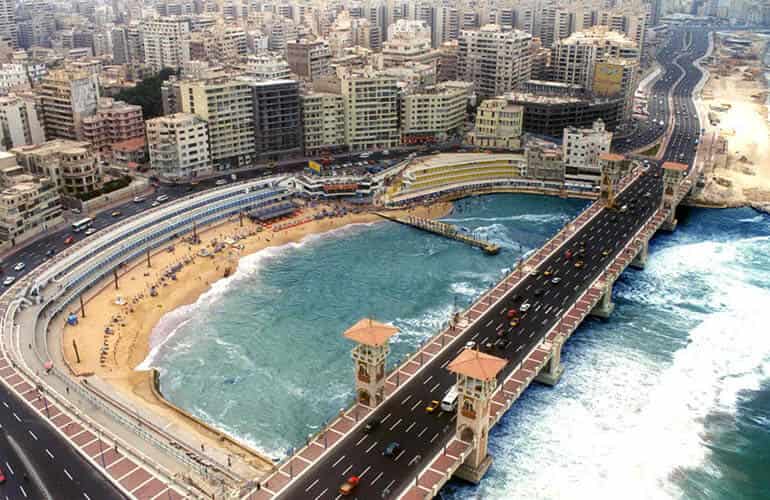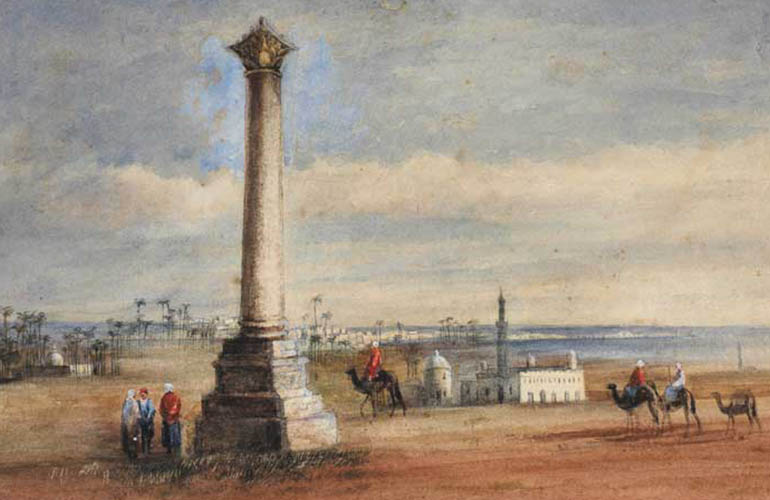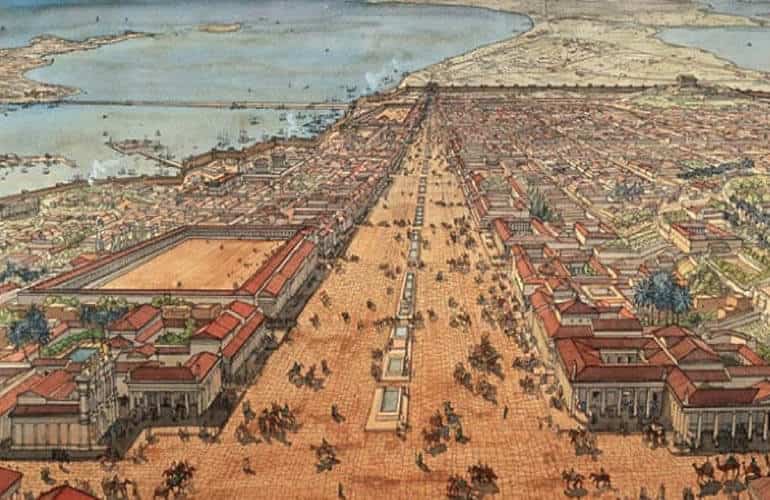Alexandria Egypt, the pride of the Mediterranean Sea

Stretching 20 km (12 miles) along the coast, Alexandria is Egypt’s second-largest city. Founded in 332 BC by Alexander the Great, the city grew to rival Rome before falling into decline in the 4th century AD.
In the 19th century, the Pasha Mohammed Ali revived Alexandria’s fortunes as a port by linking it to the Nile. This prosperity drew thousands of Europeans, who fostered the decadent atmosphere chronicled by writers such as Lawrence Durrell, E M Forster, and Constantine Cavafy.
This era ended in the 1950s as the foreigners fled Nasser’s revolution. Little remains of Alexandria’s ancient magnificence, but a few faded clues to its cosmopolitan heyday linger on.
Alexandria on the history:

When we hear about Alexandria, we think of a city of merchants, with a large port full of goods, the bustle of people running around, with a library that makes the city of Alexandria the cultural center of antiquity. Without a doubt, we move to the 3rd century BC, in full splendor, when it housed the most imposing lighthouse in history. But what happened to Alexandria, how did it go from maximum splendor to decline and near destruction? Through Alexandria-History of the Capital of Egypt Founded by Alexander the Great and His Destruction.
Alexandria foundations
Founded by the great Alexander the Great in 332 B.C. in the delta of the Nile River in northern Egypt, the city of Alexandria soon took advantage of its excellent location (on fertile land, strategically located as a port city, etc.) to become one of the great metropolises of antiquity, becoming the true cultural heart of the Ancient World. Nowadays, it is cataloged as the main port of the country and is the capital of one of its governorates (also called Alexandria).
Alexander’s Dream
It has always been said that the city was Alexander’s real dream come true. This is because Plutarch actually tells us that the general dreamed of the exact place where he would establish his city, right in front of the island of Faro, where the famous Lighthouse was built. The architect in charge of carrying out the project was Dinocrates, who was in charge of the layout of the city. In addition to the typical infrastructure
Alexandria under Roman rule

When the Romans came to her, under Julius Caesar in 69 B.C., they did so to try to end the dynastic war that had broken out between Cleopatra and her brother. After getting the two married and thus securing the former on the throne, the Roman general Mark Antony came into action. After Caesar’s death, he traveled to Egypt to convince the queen to support him. The love story that arose between the two is already part of historical legend.
They soon went to war with the Empire, which resulted in the capture of Alexandria by Augustus in the year 30, ending the country’s independence. The Romans ended up turning it into the “granary” of Rome, which meant that it did not lose its importance.
It was in the 7th century when the Persians invaded the city.
Religions in Alexandria Jews, Christians, and Muslims
The Elephantine papyri are the documents that provide us with information about this era. Attracted by the Museum and by the religious and cultural tolerance in the city, the Jews arrived in Alexandria and managed to maintain themselves as an autonomous community with certain prerogatives, which caused them to isolate themselves with their own customs and traditions and therefore to distance themselves quite a bit from Alexandria’s society. All this brought with it a strong anti-Jewish feeling.
For their part, Christians had always had an important refuge in Alexandria. It was here that the Fathers of the Church of Pentheus, Clement and Origen established a genuine Christian breeding ground and, in the same way, made an important contribution to the religious tensions that took place during the fourth century, at the head of which were Constantinople and Constantine the Great.
The Muslim conquest took place in the mid-7th century and, after a long decline, Alexandria rose from its ashes at the height of the Crusades. Later, in the 14th century, the city was brutally sacked and, during the 19th century, the British fleet bombarded the port, putting a definitive end to all the splendor of the metropolis.
Alexandria at the present time
A modern city and center of the cotton trade, modern-day Alexandria is also one of the most important tourist centers in the whole of North Africa, thanks to the ruins of its impressive past.
Book your Travel Package now to know more about Egypt history.






